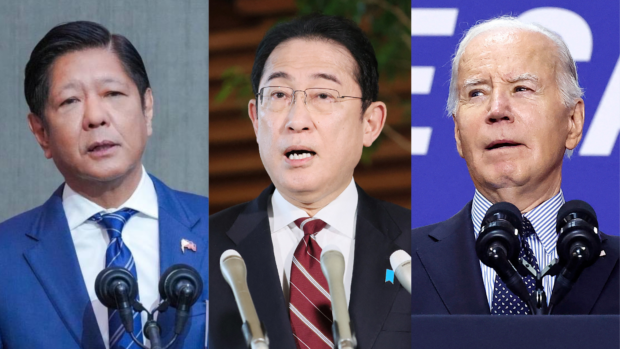
From left to right: President Ferdinand Marcos, Jr., Prime Minister Fumio Kishida of Japan and US President Joe Biden. (Official facebook page of Bongbong Marcos / AFP)
WASHINGTON, D.C., United States — The trilateral leaders’ summit here between Pres. Ferdinand “Bongbong” R. Marcos Jr., US counterpart Joe Biden and Japanese Prime Minister Fumio Kishida on Thursday is a proof of the Philippines’ growing influence in the Indo-Pacific region, several lawmakers from the Philippine House of Representatives said.
In a joint statement on Wednesday (Eastern time) Lanao del Norte 1st District Rep. Mohamad Khalid Dimaporo, Davao Oriental 2nd District Rep. Cheeno Miguel D. Almario, and Assistant Majority Leader and Lanao del Sur 1st District Rep. Zia Alonto Adiong said this acknowledgement of the Philippines’ significance in regional affairs bodes well for the country’s security and economic development.
“As a nation situated in the heart of the Indo-Pacific, the Philippines plays a crucial role in shaping the region’s future,” Adiong said.
“The trilateral summit underscores our nation’s growing influence and underscores the importance of collaborative efforts in addressing regional challenges and pursuing shared objectives.”
“The acknowledgment of the Philippines as a key partner by the U.S. and Japan is a testament to our nation’s rising stature and its contributions to regional stability, security, and economic development,” Dimaporo added.
Almario, meanwhile, said that participation in the trilateral talks is good in terms of promoting regional stability — amid rising tensions in the South China Sea.
“The Philippines’ active participation in the summit demonstrates our commitment to fostering strong alliances and promoting regional stability,” he said.
“This event marks a significant step forward in our efforts to strengthen diplomatic ties and enhance cooperation in the region,” he added.
Senior Deputy Speaker Aurelio Gonzales Jr., Deputy Speaker David Suarez, and Majority Leader Manuel Jose Dalipe, meanwhile, echoed Speaker Ferdinand Martin Romualdez’ earlier pronouncements that the trilateral meeting is a resounding call for a rules-based order in the Indo-Pacific region.
“This momentous gathering not only symbolizes unity but also underscores the urgent need for global solidarity in preserving the rules-based international system. Like what our good Speaker Martin G. Romualdez said, such a system forms the cornerstone of lasting peace, stability and prosperity across nations,” Suarez said in a separate statement.
Gonzales and Dalipe said the meeting is important as Filipinos face harassment within their own territories in the West Philippine Sea (WPS) — as he believes the stability of the region greatly affects one of the most important global trade routes.
“Sa gitna ng tumitinding tensyon sa WPS, nakikita natin ang paglago ng suporta mula sa buong mundo sa pagsunod sa rules-based order at ang pagtutulak ng freedom of navigation. We all recognize that the WPS is a vital conduit for global trade, and it should remain that way,” Gonzales said.
(Amid rising tensions in the WPS, we see the growing support from different countries in pursuing a rules-based order and for the pursuit of freedom of navigation.)
“The freedom of navigation in these waters is paramount, facilitating trade, communication and regional security. The trilateral meeting aimed to enhance cooperation among the three nations to safeguard this essential right effectively,” Dalipe added.
Earlier, Romualdez said the gathering of the three leaders does not only show unity, but also serves as a strong call to reaffirm “every nation’s unwavering commitment to upholding international law and the rules-based order”, which he said are important for ensuring regional stability.
Marcos arrived in Washington on Wednesday night (Eastern time) for a two-day official visit.
Aside from the trilateral meeting, Marcos is expected to meet with Biden and Kishida separately, attend business functions including a dinner with over 200 business executives in the US.
Philippine and American officials have confirmed that the discussions would include China’s aggressive actions that affect the Indo-Pacific Region.
Earlier, US National Security Council Coordinator for Strategic Communications John Kirby clarified that the security concerns are only a part of the various topics that will be tackled.
According to Kirby, while it might be easy to conclude that the South China Sea issue spurred the meeting, a a wide array of topics are on the table — like economic partnerships and strengthening ties between the three countries.

